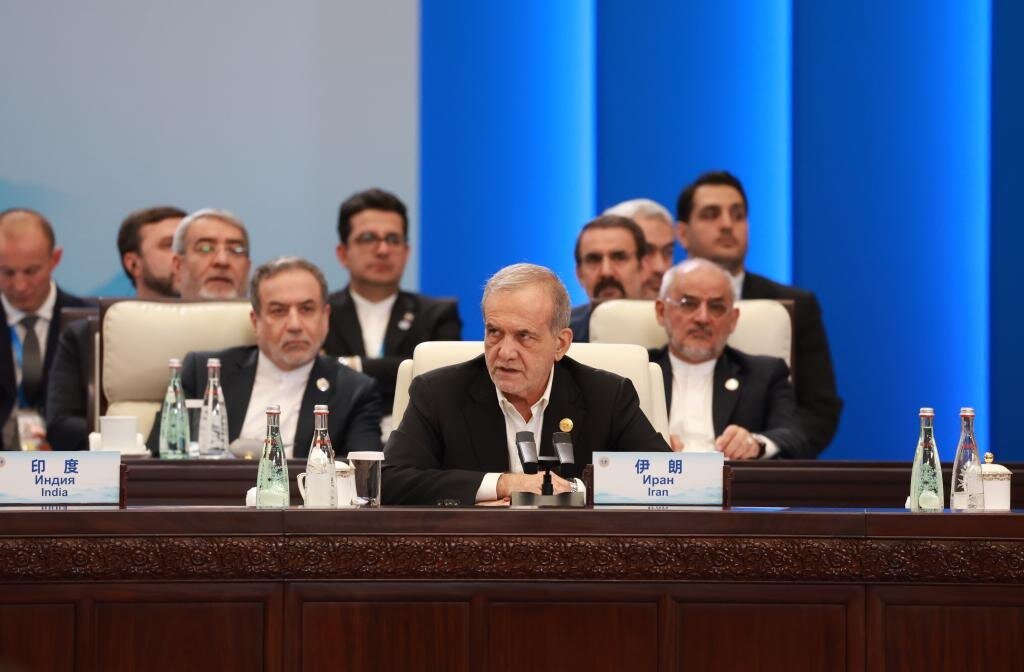Iran's Pezeshkian Proposes Shared Digital Infrastructure at SCO Summit
Iranian President Masoud Pezeshkian proposed a shared digital infrastructure and financial mechanisms at the Shanghai Cooperation Organization (SCO) summit to enhance economic cooperation and circumvent Western sanctions.

Iranian President Masoud Pezeshkian used his address at the 25th Shanghai Cooperation Organization (SCO) summit in Tianjin, China, to urge member states to adopt practical measures for peace and economic integration. Emphasizing the SCO's growing significance in a multipolar world order, Pezeshkian called for a dual-track approach: fostering regional stability and expanding economic collaboration among members.
Financial Integration and Digital Solutions
Central to Pezeshkian’s proposals was the establishment of a specialized initiative dubbed the “Accounts and Settlements of the Shanghai Cooperation Organization.” This mechanism aims to consolidate financial cooperation among SCO states, particularly by reducing reliance on the US dollar. The plan includes the expanded use of national currencies for trade and settlements, the development of a shared digital infrastructure, and the adoption of central bank digital currencies (CBDCs) to ensure secure and efficient cross-border transactions. Additionally, Pezeshkian proposed a multilateral currency swap fund to assist countries facing sanctions or liquidity shortages, positioning these measures as essential for economic resilience and a fairer, multipolar financial order.
Peace, Security, and Regional Connectivity
Beyond economic strategies, Pezeshkian advocated for the formation of a committee of foreign ministers to monitor regional crises and respond to violations of national sovereignty. He argued that such a mechanism would enhance the SCO’s role as a peacekeeper and crisis manager in Eurasia. In his speech, Pezeshkian referenced recent geopolitical challenges, including military aggression against Iran and the humanitarian crisis in Gaza, to underscore the urgent need for collective security and coordinated responses to regional threats.
Highlighting Iran’s strategic geographic position, Pezeshkian announced that the Port of Chabahar, with direct access to the Indian Ocean, would soon be linked to Iran’s national railway network. This development is expected to significantly improve connectivity between China, Central Asia, Afghanistan, and the broader region, facilitating trade and transit.
Pezeshkian also expressed Iran’s readiness to actively support the SCO’s 10-year development strategy, which prioritizes cooperation in infrastructure, energy, technology, the digital economy, climate change, and cultural exchanges. He congratulated Kyrgyzstan on its assumption of the SCO rotating presidency and reaffirmed Iran’s commitment to strengthening collective initiatives within the organization.
The summit took place amid heightened Western pressure on Iran, particularly through sanctions and diplomatic isolation. Pezeshkian’s proposals are widely interpreted as part of Tehran’s broader strategy to deepen ties with non-Western powers, bypass Western-led financial systems, and assert its influence in shaping alternative global governance models. While the SCO’s ability to shield Iran from Western sanctions remains uncertain, the summit highlighted the bloc’s growing ambition to serve as a platform for economic and diplomatic solidarity against unilateral pressures.